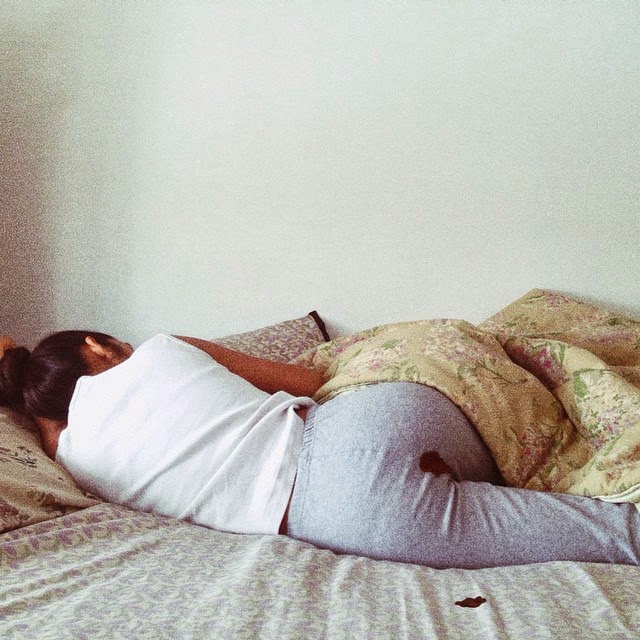Rupi Kaur was doing a final project for one of her classes
and had to take a series of photos, she posted one of those to Instagram. It
wasn’t long before her photo was removed and she was sent this message:
What did she post? Was it degrading to women? Was it
explicit? Well see for yourself:
This is one of her several photos she took to tell the
following story:
“i bleed each month to help make humankind a possibility. my
womb is home to the divine. a source of life for our species. whether i choose
to create or not. but very few times it is seen that way. in older
civilizations this blood was considered holy. in some it still is. but a
majority of people. societies. and communities shun this natural process. some
are more comfortable with the pornification of women. the sexualization of
women. the violence and degradation of women than this. they cannot be bothered
to express their disgust about all that. but will be angered and bothered by
this. we menstruate and they see it as dirty. attention seeking. sick. a
burden. as if this process is less natural than breathing. as if it is not a
bridge between this universe and the last. as if this process is not love.
labour. life. selfless and strikingly beautiful.”
I thought this was a really compelling story so I researched it
further. Instagram ended up apologizing to her and added the photo back to
Instagram. This goes back to the selfie debate. Are selfies a form of
expression or sure sign of a narcissistic human being?
In Elizabeth Day’s How
Selfies Became a Global Phenomenon, she says “A selfie can, in some
respects, be a more authentic representation of beauty than other media images.”
In Rupi’s selfie she is arguably showing the most authentic portrayal of a
woman, and what it is like to be a woman. This photo supports that debate. This
photo doesn’t degrade women and show them off in scandalous clothing. It in
fact portrays the reality of what it is like to be a woman. It also agrees with
Day’s article, “Instagram also allows us the opportunity to see below the
surface. We capture a glimpse into the makings of people’s daily lives. We get
a sense of those things that make the everyday extraordinary.” This photo that
was posted on Instagram showed males the striking reality of what women go
through. The fact that it was deleted is concerning because why are photos of
half naked women able to be posted, when this is not. This selfie shows women
and what they go through, while other photos portray a small percent of
unrealistic women. Selfies are a great way to tell a story, and this definitely
supports that. This photo should have never been deleted, it is a selfie that is compelling, and I am
Works Cited
Day, E. (2013, July 13). How selfies became a global phenomenon. The Guardian. Retrieved from http://www.theguardian.com/technology/2013/jul/14/how-selfies-became-a-global-phenomenon







No comments:
Post a Comment
Note: Only a member of this blog may post a comment.